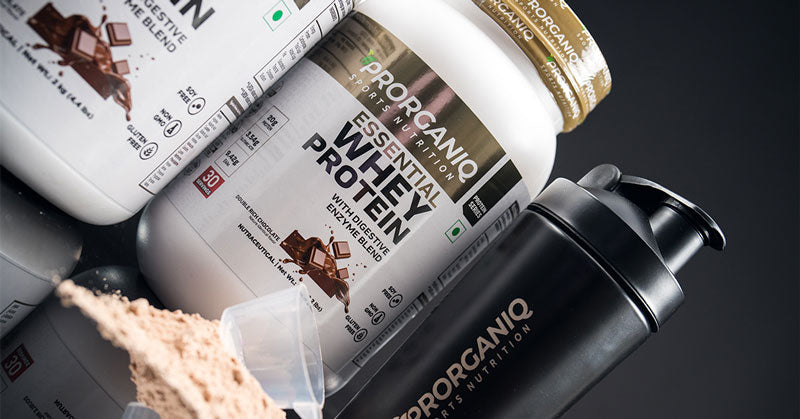Is Whey Protein Gluten-Free?
Are you curious about whether whey protein is gluten-free? Whether you're a fitness enthusiast, someone with dietary restrictions, or just seeking a healthier lifestyle, understanding the gluten content in whey protein can be crucial.
We'll explore the relationship between whey protein and gluten, addressing common misconceptions and providing clarity on this matter.
| Quick Summary |
| Yes, whey protein is naturally gluten-free. However, always check labels for added ingredients that may contain gluten. |
Understanding Gluten
What is Gluten?
Gluten is a protein present in wheat, barley, and rye. It provides elasticity to dough, aiding in its rise. Some individuals may experience adverse reactions to gluten.
Gluten Sources
-
Common sources of gluten include bread, pasta, and baked goods.
-
Less obvious sources encompass sauces, soups, and processed foods.
-
Ingredients like malt and modified food starch can hide gluten content.
Gluten Sensitivity
Gluten sensitivity leads to adverse reactions upon consuming gluten. It differs from celiac disease and wheat allergy. Symptoms include bloating and fatigue.
Whey and Gluten Basics
Whey Protein Explained
Whey protein, a complete protein sourced from milk, is highly favored in fitness and bodybuilding circles. It comes in various forms such as concentrate and isolate. These forms differ in protein content and processing methods, catering to diverse dietary needs.
When it comes to whey protein, individuals value its rapid absorption rate and high amino acid profile, aiding muscle recovery and growth. Fitness enthusiasts often opt for whey protein shakes post-workout to maximize their protein intake efficiently.
Natural Gluten Status
Whey protein is inherently gluten-free because of its milk source. This purity ensures that unadulterated whey protein products should not contain any gluten traces. Particularly, unflavored wheinforces the gluten-free assurance for those with gluten sensitivities or celiac disease.
Pros:
-
High biological value
-
Fast absorption rate
-
Rich in essential amino acids
Is Whey Protein Gluten-Free
Processing Factors
Whey protein is naturally gluten-free, but additional ingredients in powders can introduce gluten. Flavorings, stabilizers, and additives may contain gluten, so checking labels is crucial. Some manufacturers might add gluten-containing ingredients during processing.
Pros:
-
Whey protein itself is gluten-free.
-
Checking labels can help avoid gluten contamination.
Cons:
-
Additional ingredients in whey protein powders may contain gluten.
-
Some flavorings and additives could introduce gluten into the product.
Identifying Gluten-Free Whey Protein
Labels and Certifications
When it comes to determining if whey protein is gluten-free, scrutinizing labels is crucial. Look for products certified by reputable third-party organizations like the Gluten-Free Certification Organization (GFCO). These certifications ensure that the product meets strict gluten-free standards. Opt for whey protein powders with visible certifications.
e products may claim to be gluten-free without proper certification. Always verify the authenticity of these claims by checking for recognized logos on the packaging. Third-party certifications provide assurance of compliance with gluten-free regulations. Prioritize products displaying clear labels.
Bullet list:
-
Scrutinize labels for third-party certifications.
-
Verify authenticity of gluten-free claims.
-
Prioritize products with visible certifications.
Ingredient Lists
Ingredient lists are key in identifying gluten sources in whey protein powders. Ingredients like malt extract, modified food starch, and barley malt can contain gluten. Ensure you carefully read through ingredient lists to avoid unintentional gluten consumption. Familiarize yourself with tricky ingredients that may hide gluten content.
To determine if a product is truly gluten-free, focus on recognizing safe ingredients such as pure whey protein isolate or concentrate. Avoid products with added flavorings or additives that could potentially introduce gluten into the mix. By understanding common sources of gluten, you can confidently select safe options.
Numbered list:
-
Carefully read ingredient lists for potential gluten sources.
-
Recognize safe ingredients like pure whey protein isolate.
-
Avoid products with ambiguous additives or flavorings.
Ingredients to Avoid
Hidden Gluten Sources
Hidden gluten sources in whey protein powders can include malt, which is derived from barley. Brewer's yeast and modified food starch are other ingredients that may contain gluten, posing a risk for individuals with gluten intolerance.
It is crucial for consumers to carefully scrutinize product labels and opt for certified gluten-free options when choosing whey protein supplements.
Common Contaminants
Contamination of whey protein powders with gluten can occur during processing and packaging stages. Cross-contamination is a significant concern, especially in facilities where both gluten-containing and gluten-free products are manufactured.
To mitigate this risk, manufacturers should implement stringent quality control practices to prevent accidental gluten exposure in whey protein products.
Final Remarks
You now have a solid grasp of gluten, whey protein, and how to ensure your whey protein is gluten-free. Make sure to carefully read labels, avoid sneaky ingredients, and choose reputable brands for a worry-free experience.
Living gluten-free with whey protein can be seamless once you know what to look out for and how to make informed choices. Keep in mind the tips shared here to navigate the world of whey protein confidently.
Incorporate these insights into your next shopping trip for whey protein products. By being mindful of gluten content and making informed decisions, you can enjoy the benefits of whey protein without any concerns about gluten. Stay vigilant, stay informed, and continue embracing a gluten-free lifestyle with ease.
Frequently Asked Questions
Is whey protein naturally gluten-free?
Yes, whey protein in its pure form is naturally gluten-free. However, cross-contamination can occur during processing, so it's essential to choose certified gluten-free whey protein products.
What are common ingredients to avoid in whey protein for gluten-sensitive individuals?
Avoid whey protein products containing additives like malt flavoring, wheat-based ingredients, or any sources of gluten. Opt for products that explicitly state they are gluten-free and have undergone testing.


